About Earth Sciences
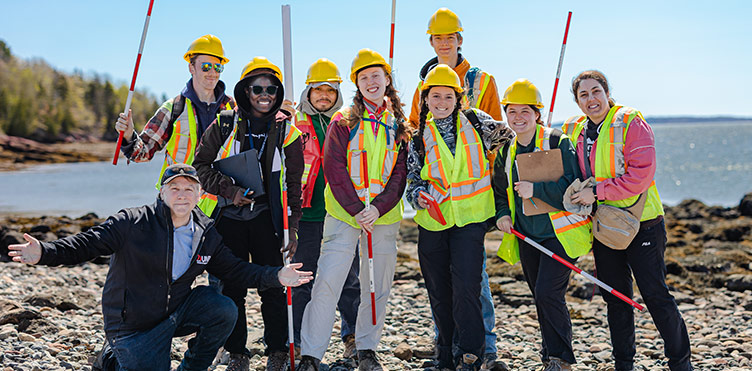
Earth is a dynamic system that involves interactions within and between the solid earth (geosphere), the hydrosphere (oceans, lakes, rivers, groundwater), the atmosphere, and the biosphere: collectively our global environment.
The earth sciences, or geosciences, are those natural sciences that study both the solid earth itself, and its interactions with these other 'spheres'. Being multi-disciplinary, geoscientists are therefore in demand for a wide variety of well-paid careers, finding employment with:
- resource, energy, finance, and infrastructure (construction) industries
- government research and regulatory agencies
- environmental and engineering consulting firms
- universities, schools, museums and natural heritage sites
Careers
Hydrologists & Hydrogeologists
Hydrologists & Hydrogeologists take care of our drinking and recreational river-, reservoir/lake-, and ground-waters. They protect and manage aquifers and wetland ecosystems, and assess flooding risks; design and construct water wells, irrigation schemes, construction drainage schemes and deal with groundwater problems associated with mining and other industry. They help to harness geothermal energy through groundwater-based heat pumps and analyze the sources of, and remediate, water pollution.
Marine Geoscientists & Oceanographers
Marine Geoscientists & Oceanographers monitor the chemical composition of the ocean water, study pollution, or help find naturally occurring resources on the seafloor; they assess the movements of the oceans, in the waves, currents, and tides that move the water itself. Their knowledge of seabed geology helps siting of offshore rigs, and the construction of wind farms and emerging technologies such as tidal power.
Geomorphologists, Sedimentologists & Glaciologists
Geomorphologists, Sedimentologists & Glaciologists examine the shallow substrate beneath our feet; the 'critical zone' where rock, soil, water, air and living organisms interact. As well as delineating industrial mineral deposits (sand and gravel), they study weathering, coastal and river erosion, siltation, landslides, subsidence, sinkholes, deglaciation and the thawing of frozen ground (permafrost) due to climate and other environmental change, and work toward their remediation.
Environmental Geoscientists
Environmental Geoscientists examine soil, rock, and the flow of groundwater to prevent contamination and to develop safe landfills and underground waste-disposal sites; they may plan the clean up from leaking pipes or chemical spills, the remediation of abandoned industrial sites, and restoration of polluted wetlands and coasts or undertake environmental impact assessments of construction projects.
Geological Engineers & Structural Geologists
Geological Engineers & Structural Geologists map and investigate the geological properties (e.g. strength, brittleness, and inherent stresses of rocks, slope stability, subsidence and earthquake potential), particularly at drill- and construction sites before any excavations, foundations, or earthworks are started for large civil engineering projects (roads, buildings, bridges, dams, mines, tunnels, pipelines, wind turbines, etc).
Mineral Exploration Geologists
Mineral Exploration Geologists identify the industrial minerals (silica, salt, potash, limestone, gypsum, etc.), metals (copper, nickel, zinc, gold, rare earths), and precious stones (diamonds, emeralds, etc) in rocks and sediments, and assess the economic viability of extracting these resources. They may monitor sample collection, preparation, and analysis of samples and enhance the processing of minerals from ores.
Mine Geologists
Mine Geologists: The extraction of metal commodities, precious stones, coal and oil sands, and industrial minerals requires that mining geologists continually assess and analyze geological data relating to resource quality and its location in order to advise on safe short-term and long-term open pit, quarry, or underground mine production plans, and for waste remediation and management.
Petroleum Geologists
Petroleum Geologists: Despite the urgent need to reduce our dependence on fossil fuels, new reserves still will be needed for where transport and power generation by fossil fuels cannot be replaced, and for lubricants, pharmaceuticals, and (non-single-use) plastics. These geoscientists locate natural gas and oil deposits, and work toward environmentally responsible extraction of these resources, including carbon storage and geothermal energy extraction.
Geophysicists
Geophysicists interpret the data of the earth's tectonic moments and assess risks for earthquake-prone areas and for other geohazards. Many geophysicists work alongside the geoscientists listed above in the exploration of petroleum and minerals, assist in the assessment of surface and groundwater flow, contaminant movements and substrate irregularities, or aid the development of carbon storage and geothermal energy.
Geochemists
Geochemists use physical and inorganic chemistry to investigate the amount and distribution of chemical elements and their isotopes in rocks and minerals; analyse the age, nature and components of rock, minerals, soil, and other environmental samples. Many geochemists work alongside the geoscientists listed above to guide oil and mineral exploration, improve water quality, and remediate toxic waste sites.
Biogeochemists & Biogeologists
Biogeochemists & Biogeologists work with the geoscientists listed above to investigate the cycling through the global environment of chemical elements, from essential 'nutrients' such as carbon, nitrogen and phosphorus, to toxic metals; they study the paleoecological aspects of ancient life forms, history and evolution of life, and establish a relative time frame for past geological and climatic events.
Earth Sciences for undergraduates
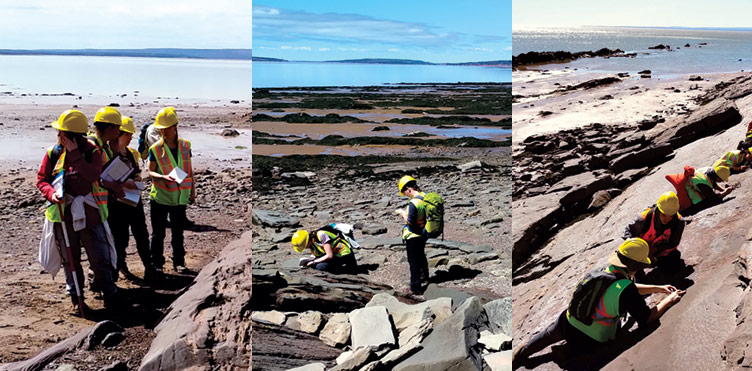
Before commencing their studies, undergraduate students should have passed grade 12: pre-calculus, chemistry, and at least one of physics, environmental science or biology. Introductory (1000-level) lecture courses in the earth sciences require no previous (high school) exposure to the earth sciences.
The Department of Earth Sciences offers the following undergraduate degree options:
- Bachelor of Science programs in Earth Sciences (BScESCI)
- Bachelor of Science programs in Environmental Geosciences (BScEnvG)
Joint programs are also offered in conjunction with other departments:
- Bachelor of Science in earth sciences and physics
- Bachelor of Science in Geological Engineering (BSE-GE)
For students in other programs who are interested in a coherent set of earth science courses, a Bachelor of Arts in Earth Sciences and a minor in Earth Sciences are also offered.
The Department of Earth Sciences also provides field school and field training opportunities throughout its 4-year degree programs.
The UNB advantage
- Focus on field techniques and field learning
- BSc degree tailored to assure professional registration across Canada
- High Faculty to student ratio and personalized education experience
- New Quartermain Earth Science Centre resources
- Numerous student awards through endowed scholarship funds
- Dedication to undergraduate research through fourth year honours projects
- Access to state-of-the-art instrumentation to support earth science research
- Strong connections with natural resource industries and government surveys
- Active and well-organized undergraduate student associate (Bailey Society)
- Summer field and lab assistant jobs starting at the end of second year
- Typically 100% job placement upon graduation
Earth Sciences for graduates (MSc & PhD)
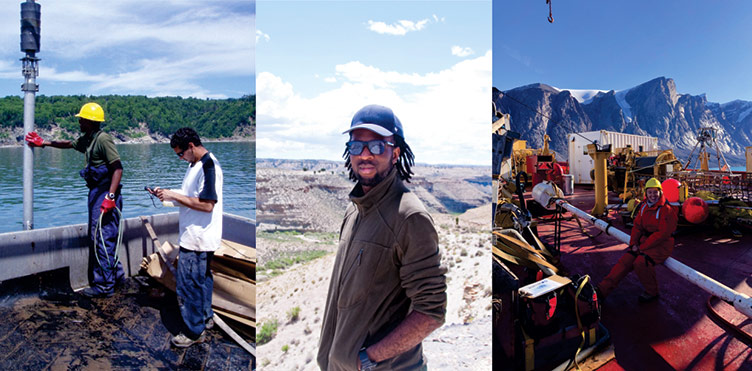
- Research-active faculty
- Highest UNB internal research ranking
- Active and well-organized graduate student society (GAGS)
- Financial support through teaching & research assistantships
- Strong links with provincial (NB-DNR) and federal (GSC) geological surveys
- Electronic access to key research publications through UNB Libraries
- Access to a comprehensive in-house analytical instrumentation
W.E. Hale Fund and the McAllister/Silver Standard Fund
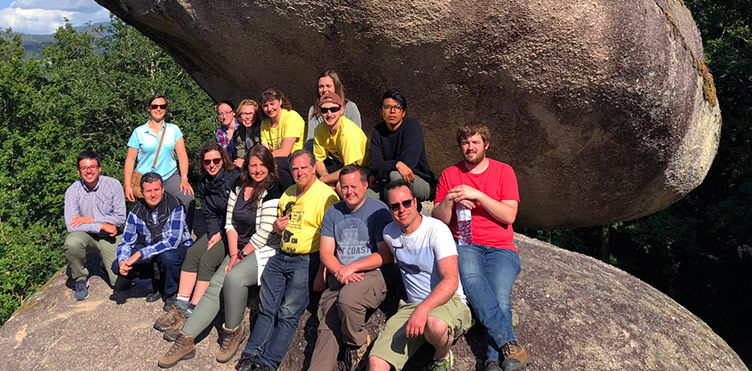
In addition to the required field schools, the department supports non-credit field trips in alternate years through the W.E. Hale Fund and the McAllister/Silver Standard Fund. These funds partly defray the cost for students of trips generally scheduled during spring break or after the end of the winter term, most recently to Spain and Portugal.
Professional registration
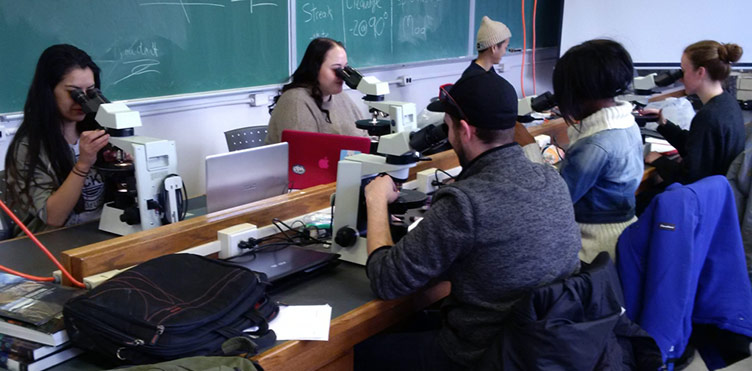
In order to manage and sign-off on geoscience projects, students should seek professional registration following completion of their BSc.
Geoscience is a regulated profession in most of Canada. Individual provinces and territories have legislative acts that restrict the practice of geoscience to individuals who are registered members of professional associations. In New Brunswick, the Association of Professional Engineers and Geoscientists of New Brunswick (APEGNB) is the licensing body. In order to meet the requirements of professional registration, specific academic training and four years of appropriate full-time experience as a geologist, or geophysicist-in-training, following graduation, are needed.
Geoscientists Canada has developed a set of guidelines for the academic training that are used by most provinces. The professional stream programs offered by the Department (earth sciences option, honours and major programs; environmental geochemistry option, honours and major programs) meet these current guidelines. However, because the academic requirements are set by the individual provincial bodies, outside of the control of the Department of Earth Sciences, and the provincial bodies are free to change their requirements at any time, there is no guarantee that a student will meet the academic requirements for registration. Students are urged to consult the relevant provincial body to ensure that they meet the necessary subject and grade requirements.
